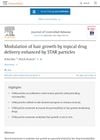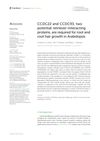 4 citations,
March 2015 in “Skin Research and Technology”
4 citations,
March 2015 in “Skin Research and Technology” Trichotillometry is a reliable method to measure hair strength and assess hair loss treatments.
 139 citations,
December 2020 in “Cell Stem Cell”
139 citations,
December 2020 in “Cell Stem Cell” Male hormones affect COVID-19 severity and certain drugs targeting these hormones could help reduce the risk.
 136 citations,
January 2013 in “International Journal of Trichology”
136 citations,
January 2013 in “International Journal of Trichology”  19 citations,
January 1997 in “Endocrinology”
19 citations,
January 1997 in “Endocrinology” Testosterone can slow hair growth in adult monkeys, but a blocker called RU 58841 can counteract this and potentially help hair regrow.
 August 2023 in “Journal of controlled release”
August 2023 in “Journal of controlled release” STAR particles can improve the effectiveness of topical hair growth treatments without causing skin irritation.
 7 citations,
February 2015 in “Clinical Therapeutics”
7 citations,
February 2015 in “Clinical Therapeutics” Finasteride and tamsulosin hydrochloride can be safely taken together without significant interaction.
 9 citations,
May 2010 in “Gynecological Endocrinology”
9 citations,
May 2010 in “Gynecological Endocrinology” Young women with PCOS and no other heart risk factors have normal heart function.
 January 2024 in “Wiadomości Lekarskie”
January 2024 in “Wiadomości Lekarskie” Robotic hair transplantation with AI offers more reliable, precise, and efficient hair restoration.
 16 citations,
October 1994 in “The Journal of Steroid Biochemistry and Molecular Biology”
16 citations,
October 1994 in “The Journal of Steroid Biochemistry and Molecular Biology” Two non-steroidal antiandrogens, RU 58841 and RU 56187, form a common metabolite at different rates, which may influence their effects; RU 56187 could be used for prostate cancer treatment and RU 58841 for acne treatment.
 3 citations,
March 2020 in “The Journal of Urology”
3 citations,
March 2020 in “The Journal of Urology” Older patients sticking to their prostate medication saw lasting health benefits.
 3 citations,
October 2022 in “Frontiers in Surgery”
3 citations,
October 2022 in “Frontiers in Surgery” Proteomics combined with other technologies can lead to a better understanding of skin diseases.

Attractive women slightly worsened mood, green backgrounds improved mood, and older people had better moods.
 6 citations,
November 2021 in “Frontiers in immunology”
6 citations,
November 2021 in “Frontiers in immunology” STAT3 signaling is important for healthy skin and hair follicles, and its disruption can lead to skin conditions like atopic dermatitis.
28 citations,
June 2015 in “Journal of circadian rhythms” An individual's morning or evening preference can predict changes in their body clock gene expression.
 September 2024 in “Egyptian Journal of Dermatology and Venerology”
September 2024 in “Egyptian Journal of Dermatology and Venerology” Low-energy fractional CO2 laser therapy significantly improves hair regrowth in women with female-pattern hair loss.
 January 2017 in “Brazilian Journal of Pharmaceutical Sciences”
January 2017 in “Brazilian Journal of Pharmaceutical Sciences” Arteannuin might work against cancer and Alzheimer's by targeting neprilysin.
 16 citations,
January 2016 in “Journal of Investigative Dermatology”
16 citations,
January 2016 in “Journal of Investigative Dermatology” Mice without the IL-6 gene had more hair growth after injury due to higher activity of a related protein, Stat3.
11 citations,
May 2020 in “Frontiers in psychiatry” Child abuse is linked to higher BMI, but not because of hair cortisol or cortisone levels.
1 citations,
April 2021 in “Clinical, Cosmetic and Investigational Dermatology” Conflicting findings in androgenic alopecia are likely due to biopsy location, hair diameter diversity, and hair follicle miniaturization.
 34 citations,
July 2014 in “Indian Dermatology Online Journal”
34 citations,
July 2014 in “Indian Dermatology Online Journal” Hair loss linked to metabolic issues and insulin resistance; early assessment may reduce future health risks.
 147 citations,
January 2014 in “American Journal of Clinical Dermatology”
147 citations,
January 2014 in “American Journal of Clinical Dermatology” Laser device increases hair density, safe for treating hair loss in men and women.
 11 citations,
May 1990 in “Journal of Dermatological Science”
11 citations,
May 1990 in “Journal of Dermatological Science” Diazoxide applied to the skin can increase hair growth without harmful side effects.
 December 2022 in “Frontiers in plant science”
December 2022 in “Frontiers in plant science” CCDC22 and CCDC93 are essential for root and root hair growth in Arabidopsis.
87 citations,
December 2015 in “Cochrane library” No single treatment is clearly effective for central serous chorioretinopathy.
 12 citations,
October 2012 in “Dermatologic Clinics”
12 citations,
October 2012 in “Dermatologic Clinics” Low-Level Laser Therapy and other light treatments for hair growth lack strong evidence and need more research.
 3 citations,
December 2018 in “Meta Gene”
3 citations,
December 2018 in “Meta Gene” Certain gene variations increase male hair loss risk, influenced by hormone levels.
 1 citations,
August 2022 in “Molecules”
1 citations,
August 2022 in “Molecules” Prunus mira kernels contain components that can promote hair growth in mice.
 2 citations,
July 2018 in “Elsevier eBooks”
2 citations,
July 2018 in “Elsevier eBooks” Some supplements may help with hair loss, but there's not enough strong evidence to recommend them without doctor advice.
 80 citations,
June 2008 in “Biomaterials”
80 citations,
June 2008 in “Biomaterials” EVAL membranes help create cell structures that can regrow hair follicles.
 11 citations,
November 2015 in “Skin Research and Technology”
11 citations,
November 2015 in “Skin Research and Technology” Women's hair grows faster and thicker than men's, but hair growth slows for both genders with pattern hair loss.


























